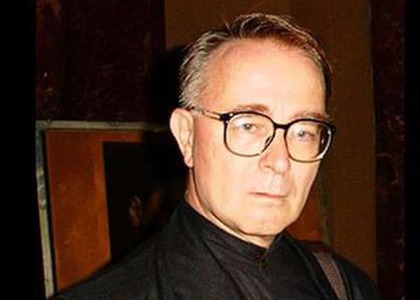> [Archived] Interviews

Interview with music critic Dumitru Avakian
During the "Musicrit" Awards Gala, which took place on January 14th, 2023, the prize for music criticism was presented to Dumitru Avakian, teacher and music critic.
Mr. Avakian, with what thoughts did you receive the distinction offered by the Union of Music Critics, Editors and Producers?
Obviously, it's one of the distinctions I really care about. I have received many awards over the decades. But what is it that makes me particularly fond of it? First of all, it is about the fact that it was given to me by my younger colleagues, in the context in which other important musicians were also awarded. I care a lot about this distinction and another one, given the fact that, nevertheless, here I am, working for 56 years in the "George Enescu" College of Music in Bucharest, years ago I received a distinction, which I understand is a supreme distinction at the professorial level, namely the "Gheorghe Lazar" award.
What do you think is the role of music criticism in today's cultural context?
The role of music criticism, in my opinion, is not only that of recording an event, but that of orientation, equally regarding the taste of the public, regarding the orientation of young musicians, performers or composers and of discerning the artistic musical phenomenon itself. I must admit that I have acquired a certain skill in observing the basic aspects of the musical artistic phenomenon. It is not only about the spectacular instrumental or vocal approach, the talent, the strength, and the power of communication. Equally, music has a substantiality about the spirituality, the thought that guides the artistic musical act, and I think that this, in different proportions, according to different situations, must be found in our written, spoken radio, television, in the written press, in conversations with young people, with colleagues. In this way we can achieve a climate, I say, healthy, regarding the context of our artistic musical life.
As you mentioned, your professional life is divided between music criticism and teaching. How would you describe the new generation of artists and what do you think is the direction music life is going in today from the perspective of young up and coming artists?
Here's a problem. The current musical life, at the professional level, is very diverse at the moment, this is because the relationships between those who propose the music have diversified a lot. Of course, there are some very special artists. Here, only recently I listened to the wonderful, I don't even know how to call him, I would call him a performing musician, Andrei Ioniță in equal measure, a wonderful cellist and a very good pianist in concert at Sala Radio. What I distinguished in him, was his special understanding of the artistic musical act and the means of communication, the appropriate means of communication. This is why the understanding of the music it gives us is one marked by enthusiasm, by joy. Music should provide joy and the ability to make you think, to think, to stay afterwards, when the sound has stopped, in the context of the music you listened to. This is very important, that each type of music plants something in us.
Translated by Georgiana-Carmen Rădulescu,
University of Bucharest, Faculty of Foreign Languages and Literatures, MTTLC, year II
Corrected by Silvia Petrescu














